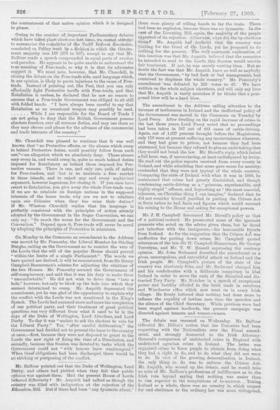Mr. Balfour pointed out that the Duke of Wellington, Lord
Derby, and others had yielded when they felt that public opinion was against them. Had the present House of Lords behaved differently P Mr. Asquith had talked as though the country was filled with indignation at the rejection of the Education Bill. But if there had beeii "any dynamite about," there were plenty of willing hands to lay the . train. There had been no explosion, because there was no dynamite In the case of the Licensing Bill, again, the majority of the people approved of its rejection. .Otherwise, what did the by-elections mean? Mr. Asquith had declared that the country was panting for the blood of the Lords, yet he proposed to do nothing for the present. The only courteous explanation of this inaction was that Mr. Asquith believed that the measures he intended to send to the Lords this Session would receive fair treatment. If not, he was merely wasting time. But no doubt the fact was that Mr. Asquith knew as well as anybody that the Government, "by bad luck or bad management, had contrived to displease the whole country." Mr. Ponsonby's amendment 'was defeated by 225 votes to 47. We have written on the whole subject elsewhere, and will only say hero that Mr. Asquith is vastly mistaken if he thinks that a post- poned blow will be a hard blow.






































 Previous page
Previous page